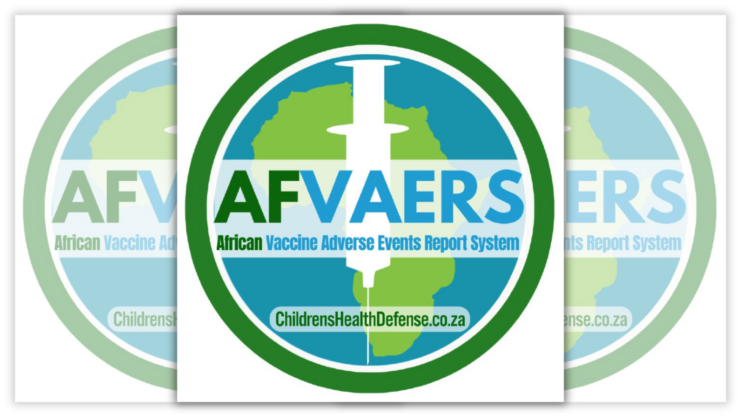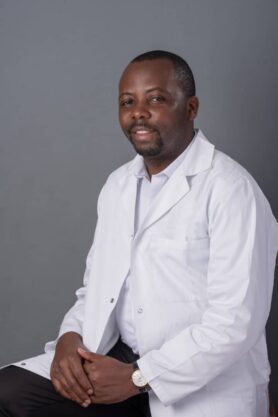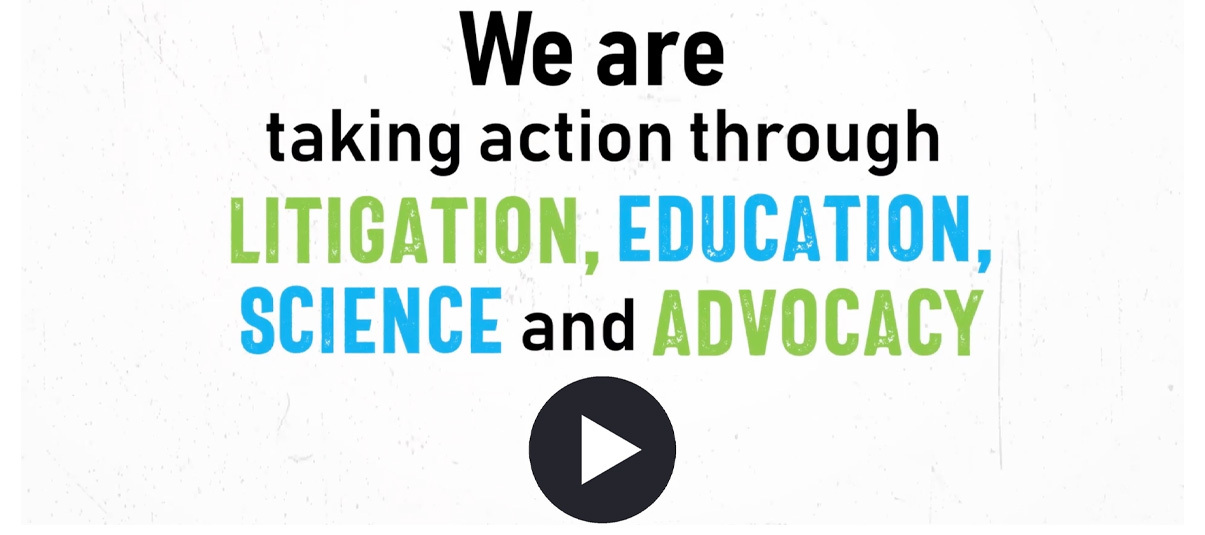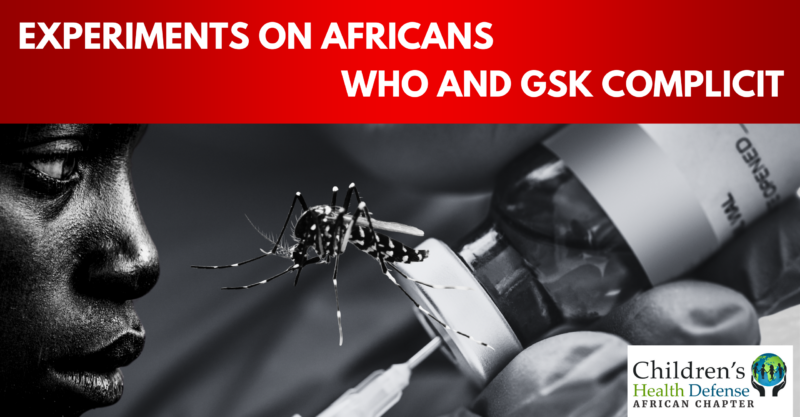Who will bring WHO and GSK to justice for experimenting on Africans?
THE NEW VACCINE AGAINST MALARIA AND MORTALITY OF AFRICAN CHILDREN.
We present the facts about how WHO, GSK, GAVI and PATH persist in using a vaccine that is dangerous in the name of saving African children from Malaria.
By Dr Jerome Munyangi and Shabnam Palesa Mohamed
The world will remember the date of April 23, 2019, the launch of the first routine malaria vaccination program in Africa. This program began with a pilot study in Malawi. The highly relevant general context of this vaccine, RTS, S was performed by GlaxoSmithKline (GSK) in 1987, and entered clinical development in the United States in the early 1990s. Partial efficacy in malaria challenge studies was reported in 1997.
In 2001, there was evidence of some short-term efficacy in Gambian adults, but the product was almost discontinued due to its modest efficacy and limited durability. Thanks to significant public and philanthropic funding (now over $0.5 billion) complementing GSK’s investments over the next decade. Trials in African children were continued, leading to Phase III data that showed an efficacy of about 35% in children, provided they received 4 doses of vaccine, three of which were outside the vaccination deadlines.
In 2015, the RTS, S Clinical Trials Partnership published the results of the Phase III trial of the RTS, S malaria vaccine, comprising 6537 infants (6-12 weeks) and 8922 children (5-17 months). RTS, S provided 18% (infants) to 36% (children) protection against clinical malaria.
The publication of data from this study has raised serious problems, including:
-
Significantly more children who received the malaria vaccine had meningitis than those in the control group who received the rabies vaccine): 21 out of 5948 in the RTS, S (with and without booster) groups, and 1 out of 2974 in the control group
-
The RTS, S groups also had more cases of cerebral malaria.
-
Higher mortality rate in patients hospitalized for severe malaria among those vaccinate
-
Professor Christine Stabell Benn’s team analysed the same data published by GlaxoSmithKline, and found that the female children who received the vaccine had higher mortality than the control group.
This was unexpected for a vaccine that allegedly reduced clinical malaria. This team assumed that the higher mortality could be due to non-specific negative effects for girls, as has been observed for other non-living vaccines. She asked for the data by gender. In 2016, she published that the vaccine was associated with a slight reduction in mortality in boys, but girls had twice the mortality if they had received the new vaccine than if they had not. This was significant in itself in both age groups.
The Danger of GSK Malaria Vaccine: Increased Risk of Meningitis and Cerebral Malaria. Despite these grave dangers, the WHO decided to test this vaccine with 720,000 African children guinea pigs who must receive 4 malaria vaccines between 5 and 17 months.
The GSK Clinical Trial violates the ethical rules of Scientific Research
- Firstly parents/guardians of vaccinated children are apparently not informed of the increased risk of death in the Phase III trial plus 16,000 African children vaccinated without consent: this is not necessary as the programme is structured as an activity of “implementation” and not as a clinical trial, so no individual consent is required.
- Second, the program is led by WHO staff (in partnership with PATH and GSK), suggesting a potential conflict of interest for WHO. The approval of intervention studies by the WHO has great weight in African countries. Third, the lack of full openness of GSK to the safety signal of female mortality has raised concerns.
- Third, one argument is that it was not a predefined evaluation criterion (which is correct), but it is a very important safety signal if it is real.
- Fourth, the lack of commitment from GSK to provide the required amount of vaccine if it obtains blanket approval, as well as progress in the larger-scale trials of other partially effective vaccine candidates, raised concerns that the risks of the implementation programme are even less justified: at least 120 million doses of a malaria vaccine are likely to be needed for African children alone each year, but GSK seems to be discussing the manufacture of only a very small fraction of this amount (using a patented adjuvant with limited availability).
- Fifth, the number of deaths may be underestimated because: The vaccine is added to the vaccination program in some regions, but not in others. There is no individual registration of participants. Deaths are difficult to follow. For example, in Malawi, there is no official death register, hospital staff have not systematically recorded deaths in hospital, and to report deaths outside the hospital, the study relies on village leaders, many of whom are illiterate.
Given the danger signals identified, there should be no such bias
Why do WHO and GSK insist on using a vaccine that reduces all episodes of malaria but increases the risk of brain malaria, which has a higher case fatality rate, especially if it means that the vaccine has no positive effect on mortality?
Both the WHO Strategic Advisory Group of Experts on Immunization (SAGE) and the European Medicines Agency (EMA) have stated that the danger signals could be due to chance but this argument is rejected by the independent analyses of the data.
The SAGE documents indicate that there is an expectation that there will be sufficient data to test the three danger signals related to meningitis, cerebral malaria and all-cause mortality.
There is an urgent need to find additional measures to combat malaria. In addition, there are apparently limits to how long GSK can maintain ongoing manufacturing activities to deliver future RTSS vaccines, and GSK therefore requests a quick decision.
Given the danger signals identified, there should be no such bias in the decision, WHO should seek advice from external experts.
Girls are more likely to die after taking this vaccine
The pilot study was launched in Malawi in April 2019, followed by Ghana and Kenya. The WHO Director said “the malaria vaccine can save tens of thousands of children’s lives”. The excited media welcomed the opportunity to fight malaria.
However, all the available evidence suggests that if you are a girl, and you participate in this study, you are more likely to die than a boy. The only justification for a large pilot implementation study would be that the increase in mortality among girls is a coincidence. The probability is < 0.001. But it could be. But given this situation, it is essential to follow children very closely for mortality.
The latest development is worrying: the pilot study was expected to have 720,000 children and last 4 years to capture a negative effect of the vaccine on girls’ mortality. But now, after pressure from GSK, WHO decided to make a decision already after 2 years.
In addition to the problems, early reports from the pilot study indicate that vaccination coverage is very low. So far in Malawi, the first dose has reached about half of the target children, further reducing the ability to detect any difference in mortality.
The lack of registration of participants, the recording of potentially defective deaths, the short follow-up and the low coverage all act in the same direction: it is difficult to document the increase in mortality in vaccinated girls. The real risk is that the pilot study finds no increase in female mortality due to these gaps, and that the vaccine will therefore be approved for use in Africa even if it has non-specific harmful effects for girls.
What will the WHO do to remedy this situation? Who will bring GSK to justice?
Independent Review of Dengue Vaccines
An independent review of clinical trial data that suggested the risk of harm to children with the introduction of a new vaccine against a tropical disease recommended by the WHO SAGE. Scott Halstead and co-authors wrote a letter to Lancet Infectious Diseases in 2016, entitled “The risks behind Dengvaxia recommendation,” in which they advocated, based on data showing increased rates of dengue hospitalization in vaccinated HIV-negative children, a more cautious approach to the introduction of the vaccine in the Philippines.
Time would show that Halstead’s concern is well-founded, as data from long-term studies reviewed after the initiation of the immunization program suggested an increased risk of severe dengue in vaccinated subjects prior to initial natural exposure to dengue virus. Linking these data with numerous public reports on severe dengue, including fatal cases, of children who received the new vaccine led to the withdrawal of the vaccine from the Filipino market and federal subpoenas for many people as part of the public health program. Public confidence in the vaccination program has been shaken, and the Philippines is currently experiencing a serious resurgence of measles.

Pharmacovigilance in Africa and AF VAERS
There is almost no post-market surveillance infrastructure for vaccines in African countries. For their interests, the donors finance the Expanded Programme of Vaccination, while pharmacovigilance is not. This disparity in the distribution of resources has an impact on the detection and reporting of vaccine side effects. This why CHD Africa has launched AF VAERS – an independent adverse events reporting system for Africa.
AF VAERS is an independent reporting system intended to amplify the voices of African vaccine victims, enhance transparency and pharmacovigilance on vaccine adverse events, and strengthen accountability through access to justice and compensation initiatives.
According to an article in the British Pharmacological Society Journal, “the majority of LMIC (low to middle income countries) with national pharmacovigilance systems have weak regulatory enforcement and minimal pharmacovigilance awareness, resulting in very low reporting rates; few regulatory decisions on medicines safety are drawn from local data. Assessment of four east African countries in 2018 showed that only ~1% of health facilities had reported medicine-related harm in the previous year.”
CHD Africa executive director and chapter coordinator Shabnam Palesa Mohamed shared “Awareness of horrific vaccine harms caused to Africans, coupled with collecting data and hearing tragic stories of vaccine harms in South Africa, compelled me to realise how critical independent and transparent reporting is for the continent. AF VAERS does not replace official pharmacovigilance systems, but it serves to raise awareness on informed consent, health and socio-economic impact, the importance of product investigations, and access to justice.”
The visionary AF VAERS project will pilot in 15 countries including South Africa (which has a SA VAERS system), Kenya, Mozambique, Cameroon, Ghana, DRC, Ethiopia, Zimbabwe, Zambia, Senegal, Uganda, Madagascar, Tanzania, Egypt and Botswana. Each country will have its own AF VAERS system. This will rapidly build up to reporting for all African countries.
CHD President and general counsel lawyer Mary Holland said “Kudos to CHD Africa for spearheading AF VAERS. These leaders are stepping in where governments have failed. There can be no “safe and effective” vaccines if there is no tracking of adverse events. This is a critical step in the right direction.”
Kenyan doctor, Dr Wahome Ngare, who features in the compelling CHD film Infertility A Diabolical Agenda said “I want to thank and congratulate CHD Africa of the launch of the Africa VAERS. It could not have come at a better time. Our systems for collecting such data are either poor, ineffective, unknown or never popularised. Having robust real time data is godsend. It would our citizens and responsible government make informed choices, thus preventing medical tyranny.”
CHD Africa welcomes your donations towards launching, growing and strengthening AF VAERS, and towards its Health Freedom Roadshow. Volunteers who would like to assist with language translations of content are also welcome to connect with CHD Africa.

Scientist Dr Jerome Munyangi

